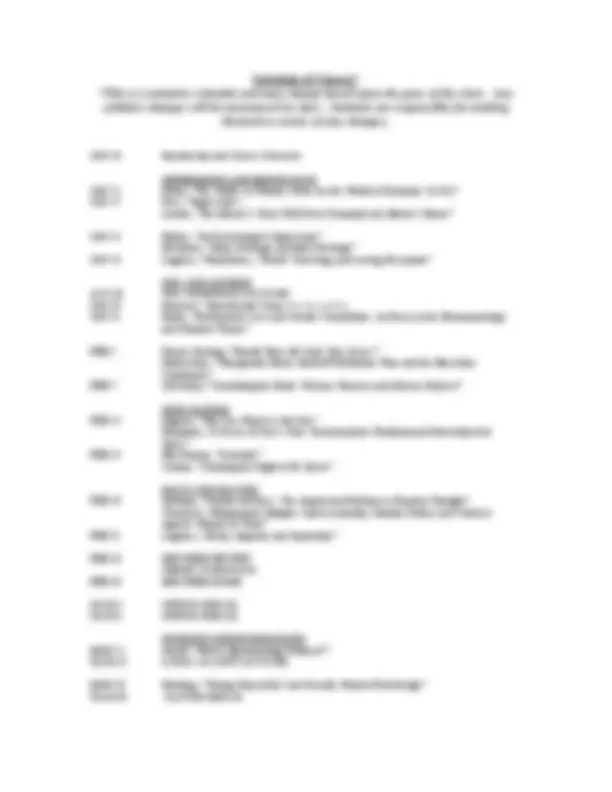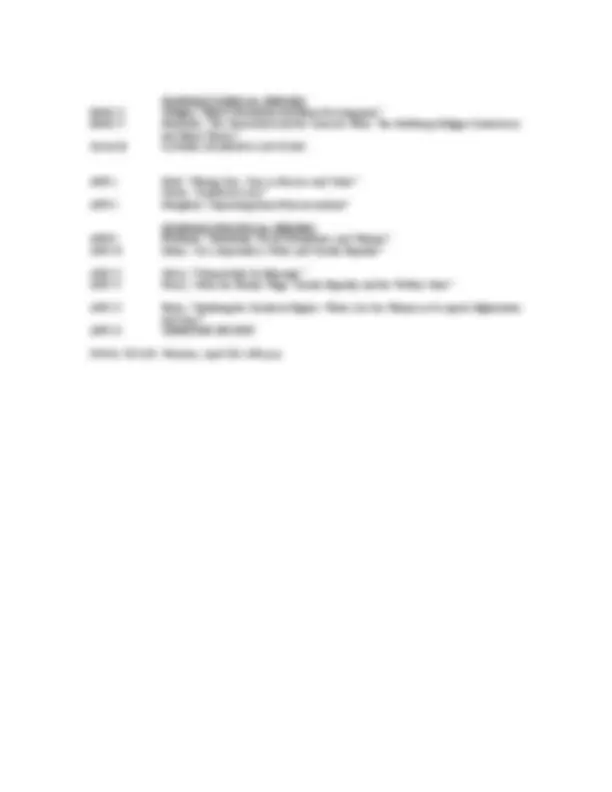




Study with the several resources on Docsity

Earn points by helping other students or get them with a premium plan


Prepare for your exams
Study with the several resources on Docsity

Earn points to download
Earn points by helping other students or get them with a premium plan
Community
Ask the community for help and clear up your study doubts
Discover the best universities in your country according to Docsity users
Free resources
Download our free guides on studying techniques, anxiety management strategies, and thesis advice from Docsity tutors
Material Type: Exam; Class: TOPICS: AESTHETICS; Subject: Philosophy; University: Rhodes College; Term: Spring 2000;
Typology: Exams
1 / 4

This page cannot be seen from the preview
Don't miss anything!



Students are expected to attend class regularly and to come to class prepared every day. We will begin each class period with a précis presentation by one of the students. A précis is a clear, compact summary of material (text, lecture, discussion, etc.) intended to capture the essential or important ideas of the original.
If you are assigned the précis for any given class period, you will need to keep your presentation to roughly 10-15 minutes. Ideally, your précis will set the tone and generally draw the guidelines for that day’s discussion. Each précis should include the following:
Précis must be emailed to everyone at least 12 hours before class begins. That means that you must distribute your précis no later than 11:00 p.m. on the evening before the day of your presentation. (No excuses!) Students should check their emails for that day’s précis, then print it out and bring it to class. If you are to be absent on the day of your précis, it is your responsibility to make sure in advance that you have a classmate serve in your place.
Précis will be factored into your grade! As stated on the syllabus, 20% of your final grade is “participation.” Poorly conceived or poorly presented précis will result in a deduction in your final participation score.
The short paper should be 5-7 full typed pages , involving an analysis of and critical reflection upon (at least) one of the texts that we cover in class before February 26. Although this is not a “research” paper (meaning you are not required to seek outside sources), simple summaries of the material will not be adequate. Students should pay attention to the technical aspects of their paper (grammar, spelling, punctuation, etc.) as well as the compositional aspects (organization of argument, clarity of ideas, substance and style).
The midterm will be given in class, and will cover all the material from the first half of the semester. The final will be given in class on the scheduled final exam day and will cover material from the second half of the semester. Both exmas will consist partly of true and false questions, part short answer questions, and at least two essay questions. Exam” review” sheets will be distributed before the exam in order to help students focus their study, and we will have a “review” day in class..
MAR 25 Gilligan, “Moral Orientation and Moral Development” MAR 27 Benhabib, “The Generalized and the Concrete Other: The Kohlberg-Gilligan Controversy and Moral Theory” MAR 28 SANDRA HARDING LECTURE
APR 1 Held, “Taking Care: Care as Practice and Value” Oliver, “Conflicted Love” APR 3 Hoagland, “Separating from Heterosexualism”
FEMINIST POLITICAL THEORY APR 8 Friedman, “Autonomy, Social Disruptions, and Women” APR 10 Kittay, “Act, Dependency Work, and Gender Equality”
APR 15 Orkin, “Vulnerability by Marraige” APR 17 Fraser, “After the Family Wage: Gender Equality and the Welfare State”
APR 22 Enloe, “Updating the Gendered Empire: Where Are the Women in Occupied Afghanistan and Iraq?” APR 24 SEMESTER REVIEW
FINAL EXAM: Monday, April 28, 1:00 p.m.